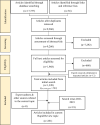Psychotherapies for eating disorders: findings from a rapid review
- PMID: 37794513
- PMCID: PMC10548609
- DOI: 10.1186/s40337-023-00886-w
Psychotherapies for eating disorders: findings from a rapid review
Abstract
Background: Psychotherapy is considered central to the effective treatment of eating disorders-focusing on behavioural, psychological, and social factors that contribute to the illness. Research indicates psychotherapeutic interventions out-perform placebo, waitlist, and/or other treatments; but, outcomes vary with room for major improvement. Thus, this review aims to (1) establish and consolidate knowledge on efficacious eating disorder psychotherapies; (2) highlight select emerging psychotherapeutic interventions; and (3) identify knowledge gaps to better inform future treatment research and development.
Methods: The current review forms part of a series of Rapid Reviews published in a special issue in the Journal of Eating Disorders to inform the development of the Australian-government-funded National Eating Disorder Research and Translation Strategy 2021-2031. Three databases were searched for studies published between 2009 and 2023, published in English, and comprising high-level evidence studies (meta-analyses, systematic reviews, moderately sized randomised controlled studies, moderately sized controlled-cohort studies, and population studies). Data pertaining to psychotherapies for eating disorders were synthesised and outlined in the current paper.
Results: 281 studies met inclusion criteria. Behavioural therapies were most commonly studied, with cognitive-behavioural and family-based therapies being the most researched; and thus, having the largest evidence-base for treating anorexia nervosa, bulimia nervosa, and binge eating disorder. Other therapies, such as interpersonal and dialectical behaviour therapies also demonstrated positive treatment outcomes. Emerging evidence supports specific use of Acceptance and Commitment; Integrative Cognitive Affective; Exposure; Mindfulness; and Emotionally-Focused therapies; however further research is needed to determine their efficacy. Similarly, growing support for self-help, group, and computer/internet-based therapeutic modalities was noted. Psychotherapies for avoidant/restrictive food intake disorder; other, and unspecified feeding and eating disorders were lacking evidence.
Conclusions: Currently, clinical practice is largely supported by research indicating that behavioural and cognitive-behavioural psychotherapies are most effective for the treatment of eating disorders. However, the efficacy of psychotherapeutic interventions varies across studies, highlighting the need for investment and expansion of research into enhanced variants and novel psychotherapies to improve illness outcomes. There is also a pressing need for investigation into the whole range of eating disorder presentations and populations, to determine the most effective interventions.
Keywords: Behavioural therapies cognitive behavioural therapy; Dialectical behavioural therapy; Eating disorders; Family-based therapy; Intervention; Psychotherapies; Therapies; Treatment.
Plain language summary
Evaluating the efficacy of treatment options for eating disorders (EDs) is important and necessary to inform both treatment guidelines and clinical practice. However, treatment outcomes in studies, and in clinical practice, can vary widely. Therefore, this review aimed to pool evidence related to a wide range of psychological treatments to help better understand what gaps in treatment need to be addressed. Using a rapid review method, three academic databases were searched, and 281 articles were identified and analysed. Results indicated that cognitive-behavioural approaches had the most evidence for well-defined EDs (such as anorexia nervosa, bulimia nervosa, and binge eating disorder). However, little research was found on other types of EDs. There was emerging evidence that provided support for self-help, group, and computer/internet-based therapies. Overall, the findings highlighted that more research is required on novel eating disorder treatments beyond what is currently available and being used as ‘gold standard’.
© 2023. BioMed Central Ltd., part of Springer Nature.
Conflict of interest statement
ST receives royalties from Hogrefe and Huber, McGraw Hill and Taylor and Francis for published books/book chapters. He has received honoraria from the Takeda Group of Companies for consultative work, public speaking engagements and commissioned reports. He has chaired their Clinical Advisory Committee for Binge Eating Disorder. He is the Editor in Chief of the Journal of Eating Disorders. ST is a committee member of the National Eating Disorders Collaboration as well as the Technical Advisory Group for Eating Disorders. AL undertook work on this RR while employed by HMA. PA and SM are guest editors of the special issue “Improving the future by understanding the present: evidence reviews for the field of eating disorders”, in the Journal of Eating Disorders.
References
-
- Pennesi J-L, Wade TD. A systematic review of the existing models of disordered eating: do they inform the development of effective interventions? Clin Psychol Rev. 2016;43:175–192. - PubMed
Publication types
LinkOut - more resources
Full Text Sources
Miscellaneous


